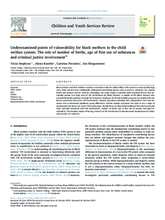Abstract
Black mothers and their children continue to interface with the child welfare (CW) system at unacceptably high rates. With research into traditionally understood contributing factors such as poverty, substance use, mental health and intimate partner violence abounding, this study sought to identify underexamined factors that potentially sustain very high rates of CW involvement for Black mothers. A sample of 415 Black mothers who accessed financial assistance through the Temporary Assistance for Needy Families program was analyzed for the factors associated with active CW involvement. Analytic procedures included, first, independent t-test and chi-square tests to determine significant group differences. Second, logistic regression was used to test a range of psychosocial risk factors for active CW involvement. Results from our final model indicated three factors beyond those typically associated with CW involvement, number of births, age at first use of cocaine and legal involvement. The standout impact of having a history of CW involvement is also discussed. Implications for policy and practice are explored.
View article here.

